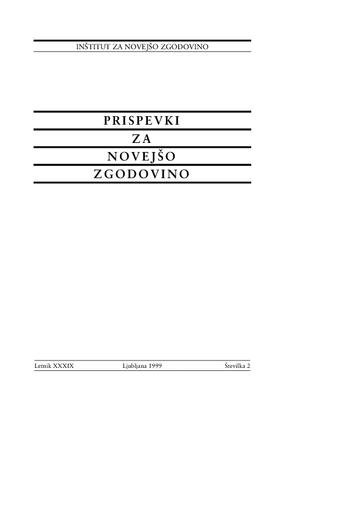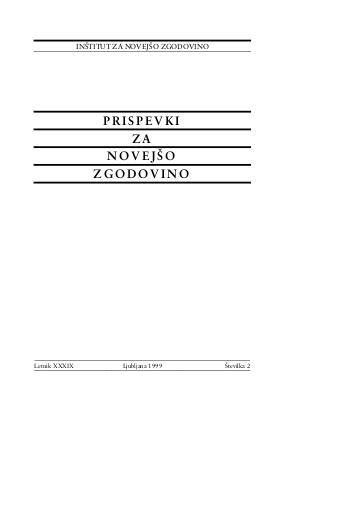
/
Periodicals
/
Prispevki za novejšo zgodovino
Yugoslavism and the National Question of the Southern Slavic Nations in the Nineteenth and Twentieth Centuries

Author(s):Jurij Perovšek
Co-author(s):Jasna Fischer (odg. ur.)
Leto:1999
Publisher(s):Inštitut za novejšo zgodovino, Ljubljana
Language(s):slovenščina
Type(s) of material:text
Keywords:jugoslovanstvo, nacionalno vprašanje, politični programi, samoodločba, Kraljevina Jugoslavija, SFRJ, Južni Slovani, unitarizem, Yugoslavism, national question, political programs, self-determination, The Kingdom of Yugoslavia, Socialist Federal Republic of Yugoslavia, Yugoslav southern slavic nations, unitarism
Rights:

This work by Jurij Perovšek is licensed under Creative Commons Attribution-NonCommercial-NoDerivs 4.0 International
Files (1)

Name:Prispevki_za_novejso_zgodovino_1999_2.pdf
Size:2.41MB
Format:application/pdf
Permanent link:https://hdl.handle.net/11686/file221
Description
In the paper, the author deals with the questions of Yugoslavism and the national homogenization in the nineteenth and twentieth centuries. He analyses the character of the Illyrian movement, the Croatian 'pravaštvo', Strossmayer's Yugoslav idea, the Yugoslav nationalist and political concepts by F. Supil and A. Trumbić and, especially, the Serbian ideas regarding the political association of the Southern Slavic nations in the nineteenth century. He also presents the Slovenian views on this question before 1918. He further deals with the nationalist questions during the time of the first two Yugoslav states. His main conclusion is that ever since the Yugoslav idea first occurred and throughout the existence of the Yugoslav state after 1918, the federalist and unitarianist concepts were in constant confrontation. The latter, in conjunction with the hegemonist Greater Serbian policy, eventually compelled the non-Serbian nations to abandon the Yugoslav state, thereby burying the idea of the association of Southern Slavic nations. Today, the Yugoslav idea is devoid of any living contents, and the only thing the present Federal Republic of Yugoslavia has in common with it, is its name.
Metadata (12)
- identifierhttps://hdl.handle.net/11686/1902
- title
- Jugoslovanstvo in vprašanje narodov v južnoslovanski problematiki 19. in 20. stoletja
- Yugoslavism and the National Question of the Southern Slavic Nations in the Nineteenth and Twentieth Centuries
- creator
- Jurij Perovšek
- contributor
- Jasna Fischer (odg. ur.)
- subject
- jugoslovanstvo
- nacionalno vprašanje
- politični programi
- samoodločba
- Kraljevina Jugoslavija
- SFRJ
- Južni Slovani
- unitarizem
- Yugoslavism
- national question
- political programs
- self-determination
- The Kingdom of Yugoslavia
- Socialist Federal Republic of Yugoslavia
- Yugoslav southern slavic nations
- unitarism
- description
- In the paper, the author deals with the questions of Yugoslavism and the national homogenization in the nineteenth and twentieth centuries. He analyses the character of the Illyrian movement, the Croatian 'pravaštvo', Strossmayer's Yugoslav idea, the Yugoslav nationalist and political concepts by F. Supil and A. Trumbić and, especially, the Serbian ideas regarding the political association of the Southern Slavic nations in the nineteenth century. He also presents the Slovenian views on this question before 1918. He further deals with the nationalist questions during the time of the first two Yugoslav states. His main conclusion is that ever since the Yugoslav idea first occurred and throughout the existence of the Yugoslav state after 1918, the federalist and unitarianist concepts were in constant confrontation. The latter, in conjunction with the hegemonist Greater Serbian policy, eventually compelled the non-Serbian nations to abandon the Yugoslav state, thereby burying the idea of the association of Southern Slavic nations. Today, the Yugoslav idea is devoid of any living contents, and the only thing the present Federal Republic of Yugoslavia has in common with it, is its name.
- V razpravi avtor obravnava vprašanje jugoslovanstva in narodnih homogenizacij v 19. in 20. stoletju. Razčlenjuje značaj ilirskega gibanja, hrvaškega pravaštva, Strossmayerjeve jugoslovanske misli, jugoslovanskih narodnopolitičnih koncepcij F. Supila in A. Trumbića in posebej tudi srbske politične misli, ki je zadevala vprašanje južnoslovanskega narodnopolitičnega povezovanja v 19. stoletju. Predstavi tudi slovenske poglede na to vprašanje v času do leta 1918. Nadalje obravnava jugoslovansko nacionalno problematiko v času obstoja prvih dveh jugoslovanskih držav. Avtorjeva temeljna ugotovitev je, da sta se ves čas obstoja jugoslovanske ideje in v jugoslovanski državnopolitični stvarnosti po letu 1918 nenehno soočali narodnofederalistična in unitaristična koncepcija. Slednja je v povezavi z velikosrbsko nadvladovalno politiko leta 1991 privedla do razhoda nesrbskih narodov z jugoslovansko državo in s tem do zgodovinskega poraza jugoslovanske združevalne ideje. Jugoslovanstvo zato danes nima več življenske moči, sedanjo Zvezno republiko Jugoslavijo pa z jugoslovansko idejo veže le njeno državno ime.
- publisher
- Inštitut za novejšo zgodovino
- date
- 1999
- type
- besedilo
- language
- Slovenščina
- isPartOf
- rights
- license: ccByNcNd
Citirano v (1)
| Tipologija | Avtor(ji) | Naslov | Kraj | Založba | Leto |
|---|---|---|---|---|---|
| 1.16 Uvodnik, predgovor, spremna beseda | Devetak, Robert | Slovenska dobrodelna akcija za bosansko-hercegovske begunce na Goriškem in Gradiškem leta 1875 | Ljubljana | Znanstvena založba Filozofske fakultete | 2018 |